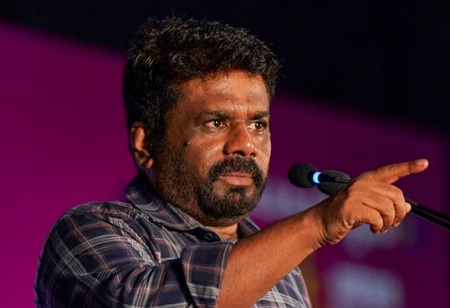
President Dissanayake Seeks Larger Parliamentary Majority in Sri Lanka Election

 Sri Lanka began voting in a snap election to decide whether to grant new leftist President Anura Kumara Dissanayake the mandate to implement his pro-poor policies as the country recovers from a financial crisis. Marxist-leaning Dissanayake, 55, was elected president in September but his National People's Power (NPP) coalition had just three of 225 seats in parliament, prompting him to dissolve the legislature almost a year before its term ended and seek a fresh mandate.
Sri Lanka began voting in a snap election to decide whether to grant new leftist President Anura Kumara Dissanayake the mandate to implement his pro-poor policies as the country recovers from a financial crisis. Marxist-leaning Dissanayake, 55, was elected president in September but his National People's Power (NPP) coalition had just three of 225 seats in parliament, prompting him to dissolve the legislature almost a year before its term ended and seek a fresh mandate.
Over 7,000 police personnel have been deployed to ensure free and fair elections at the more than 13,400 polling stations set up across the country, police officers told.
"The military is also on standby to assist the police but we do not expect any incidents", said Police Spokesman Nihal Thalduwa, adding that voting was proceeding smoothly.
Analysts say Dissanayake's coalition is expected to draw significant support, while a victory for a rival could lead to a policy logjam the country cannot afford.
The Samagi Jana Balawegaya party of opposition leader Sajith Premadasa - who favors a mix of interventionist and free-market economic policies - is NPP's main challenger. The other key contender is the New Democratic Front, backed by previous President Ranil Wickremesinghe.
"All arrangements are in place and we appeal to the public to work with us to ensure a free and fair election", Election Commission Chairman R M L Rathnayake told reporters at a pre-election briefing.
A country of 22 million people just across the southern tip of India, Sri Lanka was crushed by a 2022 economic crisis triggered by a severe shortfall of foreign currency, causing the economy to shrink by 7.3% in 2022 and 2.3% last year.
Boosted by a $2.9 billion bailout program from the International Monetary Fund, the economy has begun a tentative recovery, but the high cost of living is still a critical issue for many voters, especially the poor.
Dissanayake wants to push anti-poverty policies including bigger welfare schemes and fight corruption as a political outsider in a country dominated by family parties for decades.
He also aims to tweak targets set under the IMF program to reduce high-income taxes and free up funds to invest in welfare for millions hit hardest by the crisis.
The new government must present a budget that meets the critical primary surplus target of 2.3% of GDP for 2025, as outlined in the IMF program, while also implementing pro-poor policies and ensuring sustainable growth. However, investors are concerned that Dissanayake's push to renegotiate the terms of the IMF bailout could delay future disbursements, making it more challenging for Sri Lanka to achieve its primary surplus goal.
"In past elections, people did not have confidence in us but in September people gave us victory and proved that we are a winning party and we can form a government," Dissanayake said as the campaign neared its conclusion.
"The next task is to unite people from the four corners of this country and build a powerful people's movement", he said.

